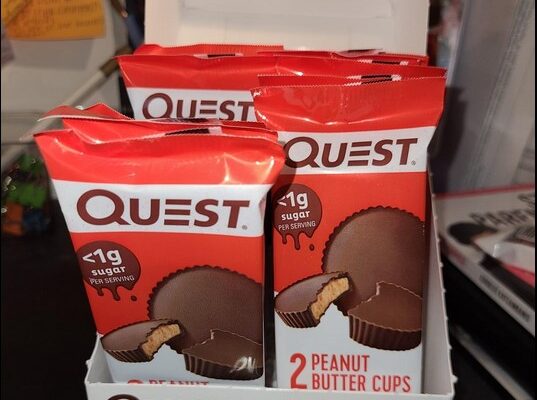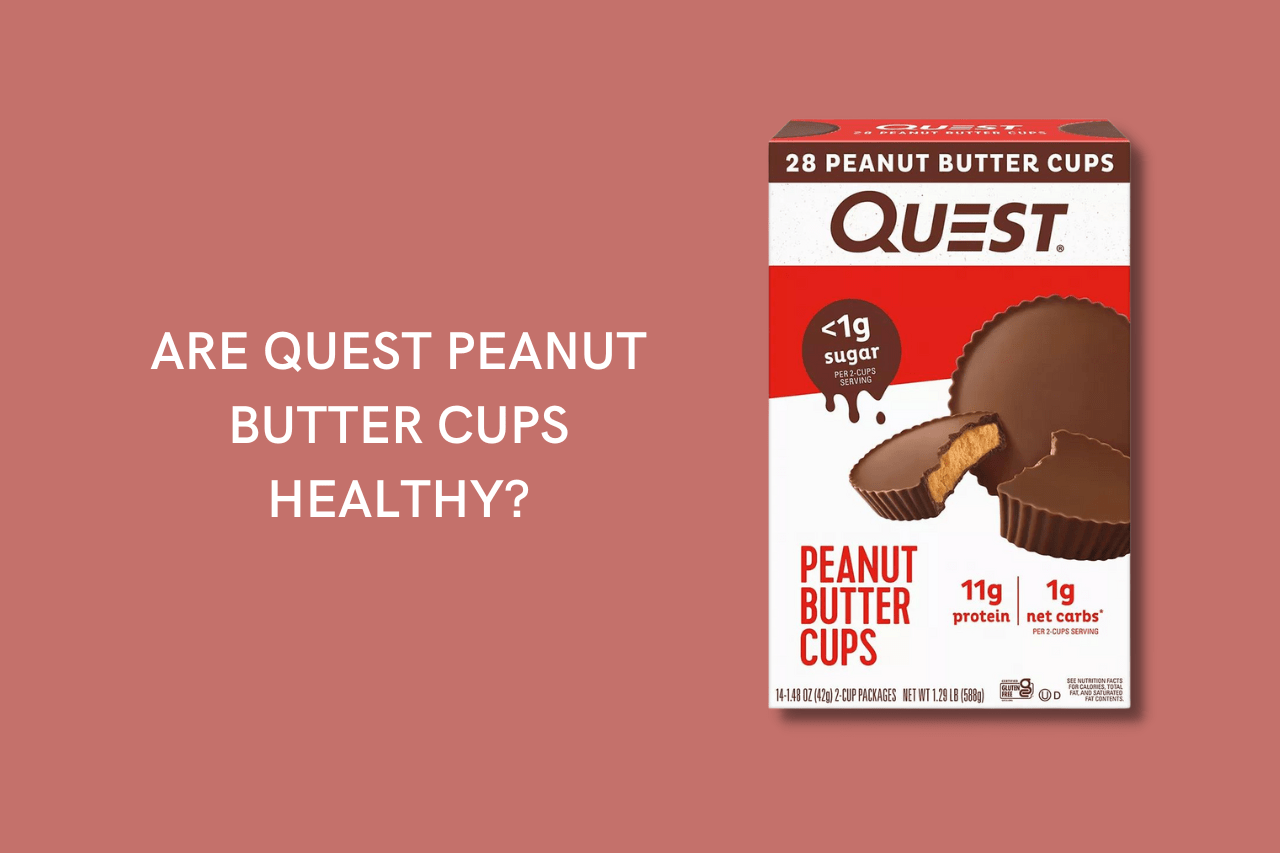When it comes to satisfying your sweet tooth, peanut butter cups are hard to beat. The combination of smooth peanut butter with chocolate coating on the outside is a match made in heaven.
However, with so many peanut butter cup brands, it can be tough to know which one is healthy(especially when you are not a label reader).
Quest peanut butter cups are one of the most popular treats from Quest Nutrition. They are made from a combination of chocolate, peanuts, cocoa butter, whey and erythritol.
And while there is no doubt about their delicious taste, are Quest peanut butter cups healthy?
Short answer: Quest peanut butter cups are healthy as they are almost sugar-free (less than 1g sugar), low in sodium and high in protein and fiber.
Read on to find more about Quest peanut butter cups, including their ingredients, protein, fiber content and more.
I’ll also explore if Quest peanut butter cups are better than Reese’s peanut butter cups.
So let’s start.
Also read: Are Quest Chips Healthy? Here Is The Answer
What are Quest peanut butter cups made up of?
Quest peanut butter cups are made up of whey protein concentrate, cocoa butter, unsweetened chocolate, peanuts, palm kernel oil, soluble corn fiber, and sodium caseinate and are sweetened with a sweetener called erythritol.
Let’s learn a bit about some of these ingredients.
Whey protein concentrate: It is the first ingredient in Quest peanut butter cups. It is a protein derived from whey(the liquid left over after milk is strained).
Palm kernel oil: It’s an oil derived from the kernel of the oil palm fruit. It is reddish in color and has high saturated fat levels.
Soluble corn fiber: It is a dietary fiber derived from corn starch and has many benefits, such as lowering cholesterol and managing blood sugar levels.
Sodium caseinate: It is a protein derived from milk that helps improve the food’s texture.
Erythritol: It is a sugar alcohol used in Quest peanut butter cups to replace sugar. It is about 70% as sweet as sugar and has a similar taste but without calories.
Quest peanut butter cups also contain other ingredients but in small quantities(less than 2%), such as sunflower lecithin, sea salt, butterfat, natural flavor, peanut oil, and sucralose.
How much protein is in Quest peanut butter cups?
Quest peanut butter cups are a decent source of protein, with 11g per serving(2 cups).
The protein in Quest peanut butter cups comes from multiple added ingredients like whey protein concentrate and sodium caseinate, both of which are dairy-based proteins.
Both the protein sources are complete proteins containing all nine essential amino acids, making them ideal for healthy muscle growth.
While 11g of protein may not be sufficient for those seeking significant muscle growth, it can still be a beneficial addition to a daily protein intake.
Here is how the protein content of Quest peanut butter cups stacks up against other peanut butter cups.
| Peanut butter cup brand | Serving size(g) | Protein(g) |
|---|---|---|
| Quest | 41 (2 cups) | 11 |
| Reese’s | 31 (2 cups) | 3 |
| Justin’s | 40 (2 cups) | 4 |
| Atkins | 17 (1 cup) | 1 |
How much fiber is in Quest peanut butter cups?
Quest peanut butter cups contain 4g of fiber per serving (2 cups). That’s about 16% of the daily recommended fiber.
While this may seem a little low to some individuals, it’s actually more than a decent amount of fiber.
According to the fiber five-to-one rule, a food product should have one gram of fiber for every five grams of carbs to be considered a good source of fiber.
With 4g of fiber and 13g of carbs, Quest peanut butter cups meet this criterion.
The combination of protein and fiber in Quest peanut butter cups is beneficial as it helps to promote satiety, keeping you feeling full for extended intervals.
That means whenever hunger strikes, you can munch on Quest peanut butter cups without guilt.
Here is how the fiber content of Quest peanut butter cups stacks up against other peanut butter cups.
| Peanut butter cup brand | Serving size(g) | Fiber(g) |
|---|---|---|
| Quest | 41 (2 cups) | 4 |
| Reese’s | 31 (2 cups) | 1 |
| Justin’s | 40 (2 cups) | 1 |
| Atkins | 17 (1 cup) | 2 |
How much sodium is in Quest peanut butter cups?
Quest peanut butter cups are low in sodium containing 125mg per serving(2 cups), which is about 8% of the ideal limit set by the American Heart Association.
Additionally, Quest peanut butter cups contain sea salt, which is usually considered less processed and has slightly more trace minerals than regular salt.
If you are following a low-sodium diet, munching on Quest peanut butter cups won’t be a problem.
Here is how the sodium content of Quest peanut butter cups stacks up against other peanut butter cups.
| Peanut butter cup brand | Serving size(g) | Sodium(mg) |
|---|---|---|
| Quest | 41 (2 cups) | 125 |
| Reese’s | 31 (2 cups) | 100 |
| Justin’s | 40 (2 cups) | 120 |
| Atkins | 17 (1 cup) | 55 |
Are Quest peanut butter cups high in saturated fat?
Quest peanut butter cups are high in saturated fat containing 10g per serving(2 cups). That’s about 45% of the daily saturated fat limit based on a 2000-calorie diet[1].
The reason for the high saturated fat in Quest peanut butter cups is palm kernel oil.
Years of studies have shown that consumption of Saturated fat is linked to causing heart-related problems such as high cholesterol and stroke.
However, recent research suggests that Saturated fat can be healthy for the heart, but only when it comes from unprocessed or minimally processed food.
Because the overall nutritional value of the Quest peanut butter cups is decent, this saturated fat content does not pose a high risk as it would from highly processed foods.
Still, if you have heart-related problems, it’s better to limit the intake of Quest peanut butter cups.
Are Quest peanut butter cups good for weight loss?

Quest peanut butter cups are good for weight loss as they do not contain added sugar. In addition, they are a good source of protein and fiber which helps in satiety.
However, it’s worth noting that Quest peanut butter cups contain 200 calories which is relatively high as per the serving size.
If you consume two or more servings (which is possible since they are small in size), you may consume a lot of calories hindering your weight loss efforts.
Remember that weight loss depends not on only one food but on overall diet and lifestyle.
Are Quest peanut butter cups keto?
Quest peanut butter cups are suitable for a ketogenic diet as they contain only 1g of net carbs.
Additionally, each serving offers 15g of fat and 11g of protein, making it easy to meet the required macros.
Are Quest peanut butter cups good for diabetics? Quest peanut butter cups are good for diabetics as they contain Erythritol as the primary sweetener. Erythritol does not raise blood sugar levels as the sugar.
Additionally, Quest peanut butter cups contain fiber, which helps to manage blood sugar levels.
Are Quest peanut butter cups gluten-free?
Quest peanut butter cups are gluten-free as they don’t contain any gluten-containing ingredients such as wheat.
However, they are unsuitable for you if you have milk, peanut, or soy allergies.
Are Quest peanut butter cups better than Reese’s peanut butter cups?
When it comes to peanut butter cups other than Quest, another brand that comes to most people’s minds is Reese’s.
But which one is a better or healthier peanut butter cups option for you?
Let’s compare them in terms of ingredients and nutrition.
Ingredients:
Quest peanut butter cups use healthier ingredients than Reese’s peanut butter cups.
For example, Quest peanut butter cups do not contain added sugar or dextrose as sweeteners. Instead, they use Erythritol, a better alternative with no calories.
Nutrition:
When it comes to nutrition, Quest peanut butter cups are the clear winner.
A serving (41g) of Quest’s peanut butter cups contains 200 calories, 15g of fat, 13g of carbs, less than 1g of sugar, 4g of fiber, and 11g of protein.
In comparison, a serving (31g) of Reese’s peanut butter cups contains 160 calories, 9g of fat, 18g of carbs, 16g of sugar, 1g of fiber, and 3g of protein.
While Reese’s peanut butter cups have lower calorie and fat content, they are also low in macros.
Additionally, they are not ideal for keto and those suffering from diabetes.
In Short, Quest peanut butter cups are better than Reese’s as they don’t contain added sugar and have more protein and fiber.
Final words
Quest peanut butter cups are healthy for you as they do not contain added sugar, are high in protein and fiber, and low in sodium, making them a great guilt-free snack option.
While they do contain higher levels of saturated fat, consuming them in moderation shouldn’t be a problem.
And let’s not forget that Quest peanut butter cups are the best in the market when it comes to both ingredients and nutrition.
If you like peanut butter cups, and haven’t tried Quest nutrition, it’s time to give a try.
Found this information helpful? Share it
Here are a few other posts that might also be helpful for you.





